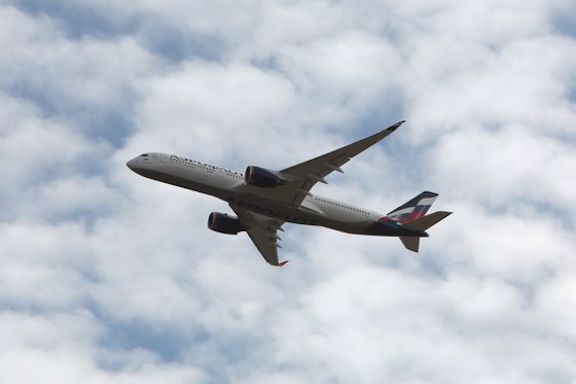Foreign aircraft owners risk billions of losses in Russia
Foreign aircraft lessors are facing the increasing possibility of writeoffs that could total in the billions of dollars as Russia considers ways to defy worldwide sanctions and keep carriers such as Aeroflot flying.
Russia’s Transportation Ministry is weighing options including buying or even nationalizing hundreds of Airbus SE and Boeing Co. planes that lessors have demanded be returned under European Union economic sanctions, the news agency RBC reported.
Airlines would then be able to operate, though in a limited fashion, given the measures barring EU countries from supplying Russia with aircraft, parts or technology, backed up by parallel restrictions in the U.S. and elsewhere. Holding jetliners in Russia would give its airlines plenty to cannibalize for spare parts and keep others flying.
“The lessors may end up having to take a writeoff,” said Nick Cunningham, an analyst with Agency Partners.
In a normal commercial situation, the firms would have the upper hand because contracts give them rights to repossess when they can’t collect. “But if Russia tells the airlines just to keep flying the planes, what can they do,” he said.

Dublin-based AerCap Holdings NV has the most planes leased to Russia at 152, with a market value approaching $2.5 billion, according to IBA. Carlyle Aviation Management’s exposure is at about 8% of its fleet, while AerCap and SMBC Aviation Capital each have about 7%, according to an updated report from the aviation consultancy.
Fortress Transportation and Infrastructure has eight planes, or about 6% of its total portfolio, in Russia, a company official said.
AerCap, the world’s No. 1 lessor, said Monday has said it will stop doing business with Russian airlines, without commenting on whether it will seek to seize back its aircraft. SMBC Aviation, a division of Japan’s Sumitomo Mitsui Financial Group, is terminating all leases in Russia, while Singapore-based BOC Aviation said it will comply with all laws.
It’ll be extremely difficult to fly aircraft out of Russia, and lessors will see a loss of value no matter where events turn, said Peter Walter, director of technical and asset management at IBA.
“You’re going to see significant amounts of bad debt, long-term litigation and the possibility some aircraft can’t be recovered,” he said. “Ramifications of this will continue to run for many years.”
Tightening Sanctions
Sanctions from the EU, the U.S. and Canada cover a range of activities, from providing services to Russian firms to conducting financial transactions that allow for payments. Many companies are still working through what’s barred and what’s allowed, but sweeping measures have been applied across aviation.
A series of escalating, reciprocal flight bans have cut off flag-carrier Aeroflot and smaller airlines such as S7 and Rossiya from serving destinations including the EU, the U.S. and Canada. Russia, in turn, has denied access to key flight paths over its territory, straining European services to Asia.
Airbus and Boeing have said they’ll suspend the supply of planes, spare parts and support to Russian customers, while Deutsche Lufthansa AG’s Technik maintenance arm—one of the largest in the world—has stopped services there.
Aeroflot has 13 Airbus A350 wide-bodies on order, according to the European planemaker. Boeing’s unfilled orders include a batch of 737 Maxes for western Siberia-based Utair Aviation PJSC and a handful of 777 freighters for cargo firm Volga-Dnepr Group, according to the U.S. manufacturer’s website.
‘Frankenstein Fleet’
Russian carriers do almost two-thirds of their business domestically, and some markets, such as Turkey, China and many others in Asia, are still open to Russian airlines, if they have access to working planes.
One approach could be following the example of Iran, which has been banned from purchasing new aircraft, for the most part, for more than 40 years. It has kept flying by relying on access to an opaque secondary market for used planes and spare parts.
Beyond cannibalizing its fleet, Russia could acquire unauthorized spares, potentially through China or India, or reverse-engineer parts and repair metal engine blades using its own aerospace industry, which has significant technical abilities, Cunningham said.
“Even if you can notionally keep aircraft flying, you’d still be creating effectively a Frankenstein fleet that would be worthless outside the former Soviet Union,” he said. “It’s really a policy decision, do they want to keep aircraft in fully certified condition or just keep flying.”
Effects of Time
Such an approach could suffice over coming months and even years, but not without a cost. Aircraft unable to meet international safety standards wouldn’t be allowed to fly to foreign markets due to airworthiness regulations, if and when more routes reopen.
Iran’s break from the U.S. following the 1979 revolution has left it with an outdated, worn fleet that it’s sometimes struggled to keep safe—from 2010 to 2016, the European Union banned most of Iran Air’s planes over safety concerns linked to access to new planes and parts.
The country managed to order new aircraft after the 2015 nuclear deal, when the U.S. briefly lifted sanctions, but received only 13 ATR turboprops and three Airbus jets from the more than 200 it sought, including Boeing models, before Washington re-imposed sanctions in 2018.
The restrictions on Russia “will bite,” said independent aerospace and defense analyst Howard Wheeldon. “It won’t necessarily hurt straight away, because aircraft are reliable. But it will eventually hurt.”
Similar Stories

Norse Atlantic expands to Stockholm with new direct flight to Bangkok
View Article
LATAM Cargo Group launches pioneering initiative in Chile with recycled plastic pallets
View Article
WorldACD Weekly Air Cargo Trends (week 46) - 2024
View Article
Freightos and E2open integrate to simplify air cargo bookings
View Article
Ethiopian Airlines received AFRAA’s Airline of the Year - Global Operations Award
View Article
Etihad Cargo and Ministry of Industry and Advanced Technology (MoIAT) partner boosting the national in-country value (ICV)
View ArticleGet the most up-to-date trending news!
SubscribeIndustry updates and weekly newsletter direct to your inbox!





